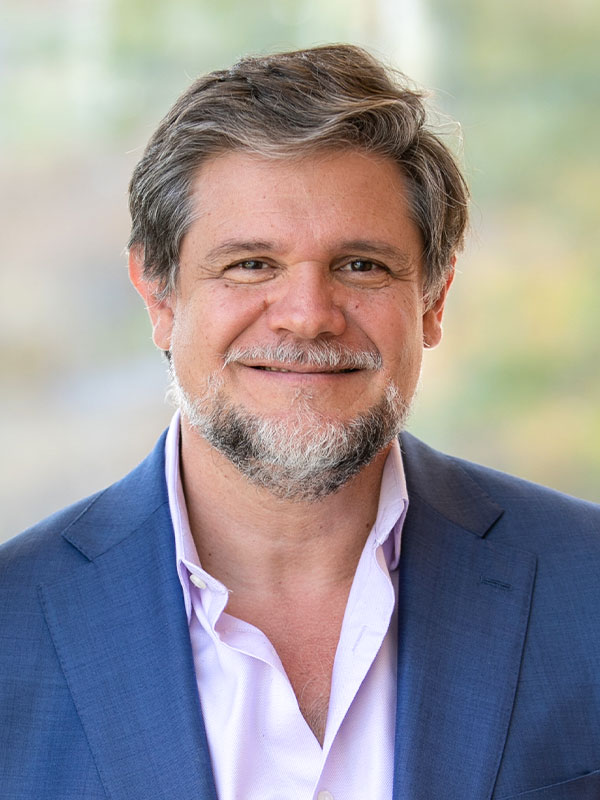![JAG Team 2022]()
Five years.
That's the amount of time that Montefiore Einstein Cancer Center (MECC) cell biologist Julio Aguirre-Ghiso, Ph.D., predicts it will take for clinical trials to start testing potential treatments for cancer recurrences that can occur months or even years after a primary tumor was first diagnosed and successfully treated.
And that's where philanthropist Laura Flug, director of the J. Gurwin Foundation, hopes to have an impact. Her support of MECC's Cancer Dormancy and Tumor Microenvironment Institute (CDTMI) founded by Dr. Aguirre-Ghiso in 2021 is a pivotal gift.

Julio Aguirre-Ghiso, Ph.D.
Professor Aguirre-Ghiso was recruited to Montefiore Einstein Cancer Center in 2021 and holds the Rose C. Falkenstein Chair in Cancer Research. He is a pioneer in the field of cancer dormancy and tumor microenvironment research. Years ago, he challenged the notion that all tumor cells that have spread (metastasized) to other parts of the body continue to grow and divide rapidly in their new environment—the prevailing belief at the time. Instead, he reported that some of these rogue cancer cells stop dividing—but survive, nonetheless.
Frozen in the cell cycle and in a microenvironment unaffected by cancer treatments and the immune system's usual monitoring efforts, these escaped cancer cells can wait in a sleep mode known as dormancy for a prolonged period of time. It is now well-established that while a primary tumor may have been successfully treated, these lingering (dormant) cancer cells in other parts of the body may persist quietly for stretches of time, seeding secondary tumors that start growing again years later.
Figuring out how to keep those cancer cells asleep is Dr. Aguirre-Ghiso's ultimate goal. “How can we exploit this dormant state? What if we can maintain it?” he said.
This is where the protein NR2F1 comes in. Dr. Aguirre-Ghiso's lab discovered that dormant cancer cells produce high levels of this protein, commonly expressed during the development of embryos. NR2F1 is also a nuclear receptor, which means that part of the protein is responsible for processing DNA signaling to stop cell growth. Yet another part of the protein has the ability to bind signals. This is the function that Dr. Aguirre-Ghiso hopes to exploit. The hope is that in identifying the exact chemical molecule capable of turning “on” NR2F1, it can also be stopped, and the cancer cells will remain permanently locked in their frozen state.
Dr. Aguirre-Ghiso's lab, in collaboration with a team led by Evripidis Gavathiotis, Ph.D., a professor of biochemistry and medicine at Einstein and co-leader of MECC's Cancer Therapeutics Program, screened millions of molecules in order to identify a subset of molecules that might best turn NR2F1 “on” and thus keep the cancer cells dormant. Through their combined efforts, they have identified approximately 60 compounds.
That's where Ms. Flug's donation comes into play. Her gift has allowed the CDTMI to hire a technician to analyze and assess the dozens of flagged compounds. The most promising 5 to 10 compounds could then be candidates for drug development. “Laura's gift allows us to move this collaborative effort forward,” Dr. Aguirre-Ghiso said.
Ms. Flug has a master's degree in public health from Columbia University and worked as an administrator at Mount Sinai Medical Center for many years. She has a long history of supporting basic science research in the United States and around the world.
Ms. Flug met Dr. Aguirre-Ghiso at the 2022 “Spirit of Achievement Luncheon” hosted by Albert Einstein College of Medicine's Women's Division. “I was very impressed with Julio's enthusiasm and determination,” she said. His research “made sense and aligned with my other interests.”
She said she was also attracted to “the possibility that we'll see an impact from his findings during our lifetime. Julio is close to the point where he can bring something to the table—a possibility for a treatment that could make a real difference in treating this dreaded disease. If I can play a small role in that moonshot, I'm in!”
That's what excites Dr. Aguirre-Ghiso. For the cancer biologist who began his career in his native Argentina fundraising to send himself to scientific conferences, his CDTMI work is both emotionally and intellectually galvanizing. He said he watched his grandmother die of pancreatic cancer when he was 10. “That was very hard...but really understanding how cancer cells communicate with host cells continues to mesmerize me.”
He outlines three major goals for his work. "My biggest goal is to understand how these cells are surviving in a quiescent mode,” he said.
Second, he wants to develop novel tools and biomarkers to identify these cells so that they can remain asleep—permanently. Finally, he wants to understand what it is in an individual—their genetics or lifestyle habits or other conditions—that leads to relapse or not.
This project should help make great strides with his three goals. He shared that “When Laura reached out and said she wanted to fund something that is closer to helping people, I said, 'we have the right project that aligns with our research and your goals.'”
Back to Donor Spotlights